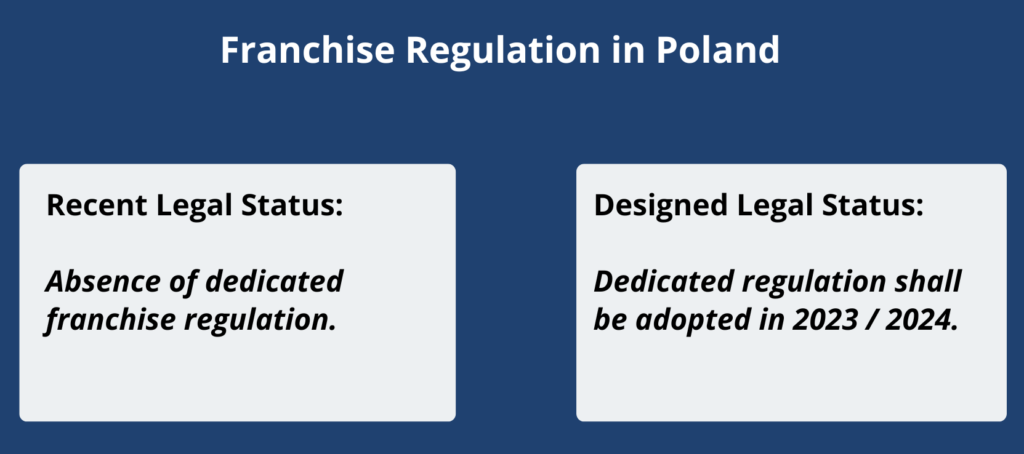Franchise in Poland
- Antitrust / Competition Law
- Unfair competition
- Consumer Protection
- Payment terms (delays)
- Advertising Law
- Franchise Regulation

Updated: 20.10.2023
Franchise in Poland
It is estimated that currently over 500.000 employees are involved in franchise networks in Poland. According to data provided by Association of Entrepreneurs and Employers from 2020, there were over 1,300 different franchise networks operating in Poland at that time. Despite this substantial presence, the Polish franchise market has not fully realized its potential. Experts anticipate ongoing growth in the franchise and distribution sector in Poland in the forthcoming years. In 2019, Forbes recognized Poland as one of the most appealing countries for franchising, and this trend is evidenced by the growing presence of international franchises in the Polish market. Polish market is still considered as interesting and providing number of franchise opportunities, especially in food and retail sectors and clothing.
Franchise – recent legal framework
Although the Polish franchise market is mature and stable there are no specific regulations dedicated to franchising in Poland. Legal aspects within the franchising are governed mainly by a combination of:
- commercial law,
- competition law,
- intellectual property law and
- tax law.
Additionally, parties involved in a franchise relationship may seek guidance on Polish employment law, European Union regulations and financial law matters.

Sale of franchise in Poland
The sale of a franchise to a Polish entrepreneur does not require a physical presence or the establishment of business or company registration in Poland. However, if a foreign franchisor intends to establish a long-term on-site presence in the Polish market, a LLC is the most common structure chosen by both foreign and domestic franchisors. This corporate form requires a minimum capital investment of PLN 5,000 and provides limited liability, meaning that only the company’s assets are at risk to creditors, with a few exceptions. Furthermore, a limited liability company offers greater flexibility in terms of its internal structure and operational procedures. It is also recommended to register a trademark in Poland, if it is not yet protected at European Union level.
There are no special franchising regimes in specific sectors and no specific prohibited activities in terms of franchising under Polish law. Nevertheless, entrepreneurs active in for example banking sector must meet all applicable banking sector regulations. The obligation to meet such sector-specific requirements usually refers to the franchisees operating in a given market and does not directly affect the franchisor.
Governing law and jurisdiction
The involved parties have the possibility to select both the applicable law and the jurisdiction, including the option of arbitration. While it is recommended to designate the law of the home country of either party (franchisor or franchisee), it is not mandatory. In accordance with the EU Rome I Regulation, the parties have the freedom to opt for the law of any jurisdiction they desire.
Enforcement authorities – franchise
In Poland there are not dedicated regulatory bodies responsible for overseeing the franchise market. As a result, the legal framework governing franchises is enforced either by the courts or by authorities with jurisdiction over specific industries.
The president of the Office of Competition and Consumer Protection (OCCP), which is the body that supervises compliance with competition and consumer law, the most significant impact on the franchise market.
The president of the OCCP is entitled, among other things, to:
- conduct proceedings in case of practices that violate the common interests of consumers,
- conduct antitrust proceedings against entrepreneurs that breach a prohibition of practices in restraint of trade,
- control a concentration of entrepreneurs – this is aimed at avoiding a situation in which, as a result of a merger, a significant limitation of competition on the market may occur, in particular through the creation or strengthening of a dominant position of an entrepreneur that allows it to act in isolation from competitors, contractors and consumers.
Trade associations for franchise sector
In Poland, the Polish Association of Franchisors functions to protect the rights and represent the interests of its members in relation to state authorities, administrations, local government bodies. All companies meeting the statutory requirements can join the organisation.
Since the association is a self-governing and non-mandatory entity, there are no business-related consequences associated with non-membership. Nevertheless, the organization offers special benefits such as certificates of credibility for its members.
Franchise agreements
Franchise agreement in Poland is not subject to specific regulation within the Polish Civil Code or any other civil law statutes. Consequently, these agreements are established in accordance with the principle of contractual freedom, while adhering to the limitations imposed by that principle. Article 3531 of the Polish Civil Code imposes three limitations on the freedom of contract. These are:
- the nature of the legal relationship,
- the law,
- the principles of social coexistence.
This means that provisions indicated in franchise agreement as well as its purpose must comply with the abovementioned rules. In the event of non-compliance, the franchise agreement may be declared invalid in part or in whole. In specific cases, the effect of invalidity is replaced by another one, e.g. replacing invalid provisions of the contract with content consistent with the generally applicable regulations.
Absence of legal definition of „franchising”
‘Franchising’ is not defined in Polish law. The franchise agreement is the so-called an unnamed contract which means that none of the laws regulates the required elements of a franchise agreement. Thus, basic features and assumptions are shaped by economic practice and the shape of its content is left to the will of the parties, subject to the above-mentioned restrictions on freedom of contract.
Parties to franchise agreement
The franchise agreement is concluded between:
- franchisor – the creator of the business concept and brand owner, and
- franchisee – an entrepreneur who uses a proven business idea.
Purpose of franchise agreement
The purpose of the franchise agreement is to regulate cooperation between the franchisor and franchisee. The most important features of the franchise are as follows:
- the franchisor grants the franchisee permission to use its name, company, emblem, symbols, trademarks, patents, know-how, concepts, marketing policy and techniques of running a business, with an obligation to provide assistance
- the franchisee undertakes to run his own business in accordance with the instructions of the network organizer and to pay remuneration.
Legal form of franchise agreement
Polish law does not require any specific legal form (eg, written, deed) for franchising agreements. However, should the parties agree on the transfer of IP rights in an agreement that is subject to Polish law, the agreement must be in written form (wet signature or qualified electronic signature).
Franchise – new regulation in Poland (still pending – 2023/2024)
Polish Parliament is processing new regulation of Polish franchise business. The draft amendment to the Polish Civil Code in this matter is to be adopted by the Council of Ministers and submitted to the Parlament by the end of 2023. The amendment to the Civil Code is to enter into force after 3 months from the date of announcement. Importantly, the new regulation will apply to contracts concluded after the entry into force of the law. The situation should thus be closely monitored by any foreign franchisors considering entering the Polish market.
The upcoming amendment of Polish Civil Code involves a number of changes that aim to regulate and structure aspects of the franchise agreement. Polish government identified the necessity to regulate the franchise agreement due reported problems, which include, among others:
- unreliable information presented by franchise systems operators
- contractual imbalance of the parties
- non-market prices for the purchase of goods by the franchisee
- hidden fees (apart from franchise fee)
- long-term obligations of franchise agreements
- difficulties in terminating franchise agreements
- improper balance between the amount of franchise fees and the franchisee’s profit
Summary of new regulation of franchise
New section
Articles 76410 – 74621 of the Civil Code will be dedicated to this new type of agreement – franchise agreement. According to the definition, the franchise relationship will consist in the franchisor making available to the franchisee, for remuneration, the concept or technique of conducting business activity (know-how) as well as things or rights serving to perform this activity, in particular the name of the entrepreneur, trademarks and patents, whereas the franchisee will be obliged to conduct business activity on its own behalf and on its own account based on the provided concept.
Legal form of franchise agreement
The franchise agreement will require documentary form under pain of nullity. Article 76, paragraph 1 of the Industrial Property Law will also be amended, according to which the granting of a licence will have to be made in the form of a document on pain of nullity, and not in writing as it has been the case so far.
It is intended to enable an efficient process of concluding and handling this type of agreements through the use of modern forms of submitting declarations of intent, including by means of electronic communication. At the same time, by reserving the rigour of nullity, this form will ensure an appropriate level of security of civil law transactions.
Information document from the franchisor and template of franchise agreement
Potential franchisees will need to receive – no later than 14 days before concluding the franchise agreement – current information document and a template of the franchise agreement.
The information document shall contain at least:
- data identifying the franchisor;
- description of the franchisor’s business activities, in particular the number of franchise agreements concluded as at the end of the previous calendar year;
- description of the activity to be performed by the franchisee;
- method of determining the franchisor’s remuneration;
- description of the franchisor’s services, in particular listing the business concepts or techniques, items or rights made available for use;
- information about the estimated value of expenses or outlays necessary to be incurred by the franchisee in order to commence the performance of the franchise agreement;
- information about the estimated amount of the franchisee’s revenue (franchising income) and the method of its calculation;
- information about the franchisee’s obligation to conclude agreements with third parties indicated by the franchisor, if such agreements are to be concluded;
- information about the scope and means of supervision by the franchisor over the manner of performance of the franchise agreement by the franchisee, in particular about the scope of access to the franchisee’s business secrets and the franchisor’s right to issue guidelines and orders, provided that the franchisor’s supervision over the manner of performance of the franchise agreement by the franchisee is envisaged;
- information on the rules for the transfer of rights and obligations arising from the franchise agreement and the accession of a new person to the agreement on the part of the franchisee, if such a possibility is provided for;
- information about the events constituting the basis for imposing contractual penalties and the method of determining their amount, if the imposition of contractual penalties is envisaged;
- duration of the franchise agreement and terms of its extension;
- deadlines for terminating the franchise agreement;
- information about the non-competition, including the dates of validity of this ban, if a non-competition is included.
It’s worth to mention that the franchisor will be obliged to submit the information document not only prior to the conclusion of the franchise agreement, but also prior to any amendment of the agreement. If the franchisee does not consent to accepting the offer to change the franchise agreement, the parties remain bound by the existing terms and conditions of the agreement.
The provision of the information document is intended to protect the franchisee. Thus, violation of abovementioned obligations may result in various consequences.
Right to terminate franchising agreement in absence of information document
First of all, the franchisee will be entitled to terminate the franchise agreement with immediate effect if the franchisor did not provide the franchisee with the information document or included in it unreliable or false information regarding important matters. The conditions to use this way of termination of contract are following:
- it must be reasonable to assume that if the franchisee had been properly informed about them, he would not have concluded the agreement.
- thirty days have not elapsed since the franchisee became aware of it.
The possibility to terminate the contract with immediate effect due to abovementioned circumstances expires after one year from the date of conclusion of the franchise agreement.
Moreover, the franchisor will be obliged to repair damage caused to the franchisee by including unreliable or false information in the information document, unless he is’s not his fault.
Prohibition of competition
Non-compete clause will be allowed only for the duration of 1 year. After termination of the franchise agreement, the non-competition clause may only include the franchisee’s obligation not to create a competitive franchise system for a period not longer than one year from the date of termination of the franchise agreement.
Franchise termination notice periods
Termination of a franchise agreement for a fixed period will take place in the cases specified in the agreement, and for an indefinite period with:
- 3-month notice period if the terminating party is the franchisee, and
- 6-month notice period if the terminating party is the franchisor.
The amended regulations also provide the possibility of terminating the franchise agreement by either party with immediate effect if the circumstances specified in the new law.
Termination of franchise with immediate effect
The franchisor will be entitled to terminate the agreement with immediate effect if:
- the franchisee did not start a business activity based on the franchise agreement within six months from the date of conclusion of the agreement or permanently stopped running it;
- the franchisee has been legally prohibited from conducting business activities within the scope of the franchise agreement;
- the franchisee has lost full legal capacity;
- there has been a flagrant breach by the franchisee of an essential provision of the contract causing irreversible consequences, or the franchisee, despite a written warning, continues to violate material provisions of the franchise contract;
- despite a written request for payment, the franchisee is in default in paying the franchisor’s remuneration for two full payment periods.
The franchisee will be entitled to terminate the agreement with immediate effect if:
- there has been a gross violation by the franchisor of an important provision of the agreement causing irreversible consequences or the franchisor, despite a written warning, continues to violate essential provisions of the franchise agreement,
- if the conditions described above regarding the lack of providing the franchisee with the information document or including in it unreliable or false information occurs.
Statute of limitations – penalties
The provision on contractual penalties will stipulate that a claim for payment of a contractual penalty will expire one year from the date on which the franchisor became aware, or by exercising due diligence could have become aware, of the non-performance or improper performance of an obligation by the franchisee, unless the franchisor has made a call for payment of the contractual penalty within that period.
Reduction of the franchisor’s remuneration
The draft amendment introduces a right for the franchisee to request a reduction of the franchisor’s remuneration in the event that the franchising income from the business has been significantly reduced and the franchisee is not responsible for this. The reduction in remuneration is to cover the period during which the revenue has been significantly reduced. The franchisor’s remuneration shall be reduced by way of a lawsuit or objecton of the franchisee.
Collaterals in franchise agreements
A blank bill of exchange given to the franchisor in order to fulfill or secure performance under the franchise agreement should contain the reservation “not on commission” or another equivalent. If the franchisor, in order to fulfill or secure a benefit under the franchise agreement, accepts a blank bill of exchange, that does not contain the “not to order” or other equivalent reservation and transfers such a bill of exchange to another person, the franchisor is obliged to repair the damage suffered by the issuer of the bill of exchange. This regulation will also apply when a blank bill of exchange is in the possession of another person against the will of the franchisor.
Confidentiality & IP in franchise relationship
The draft amendment stipulates that, unless the parties have agreed otherwise, the franchisee will be obliged to keep secret the confidential concept or technique of conducting business provided by the franchisor, and the obligation to keep secret will not be limited in time.
Regarding IP rights – unless the parties to have agreed otherwise, the franchisee won’t be entitled to transfer the rights under the franchise agreement to another person or make it as a contribution to the company.
FAQ – Franchising Laws in Poland
Is there a dedicated franchise regulation in Poland?
No, there is no dedicated franchise regulation in Poland. It is still in designing process and shall be adopted in 2023/2024.
What are the biggest franchise chains in Poland?
The biggest franchising chains in Poland in 2023 are: Żabka, ABC, Livio, Lewiatan, Nasz Sklep Express, Rabat, Chrten, Groszek, Odido, Delikatesy Centrum, Nasz Sklep, Eden, Gama,Carrefour, Sklep Polski.
